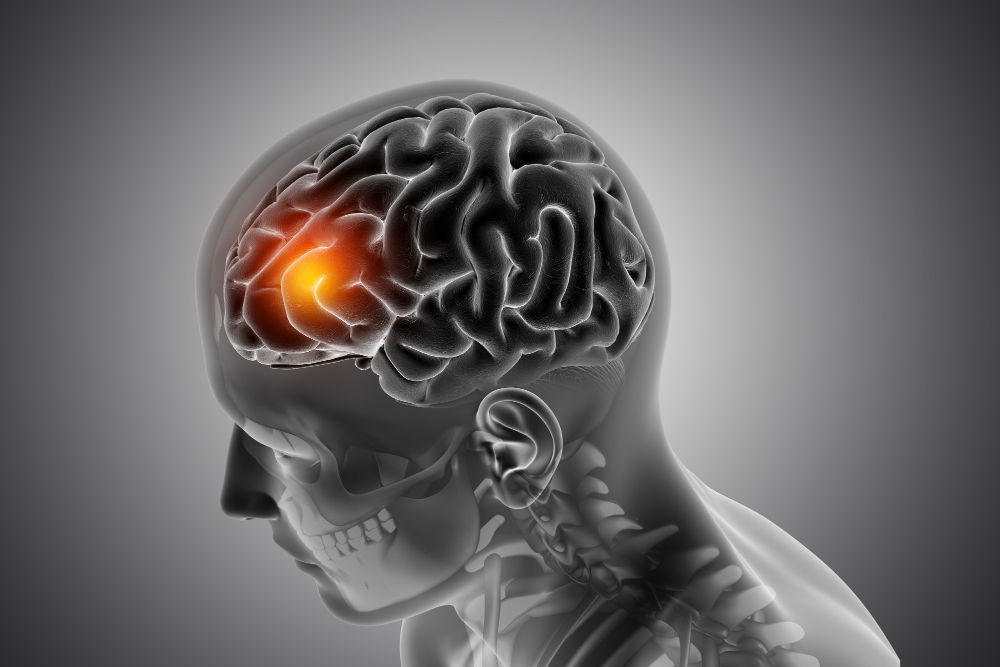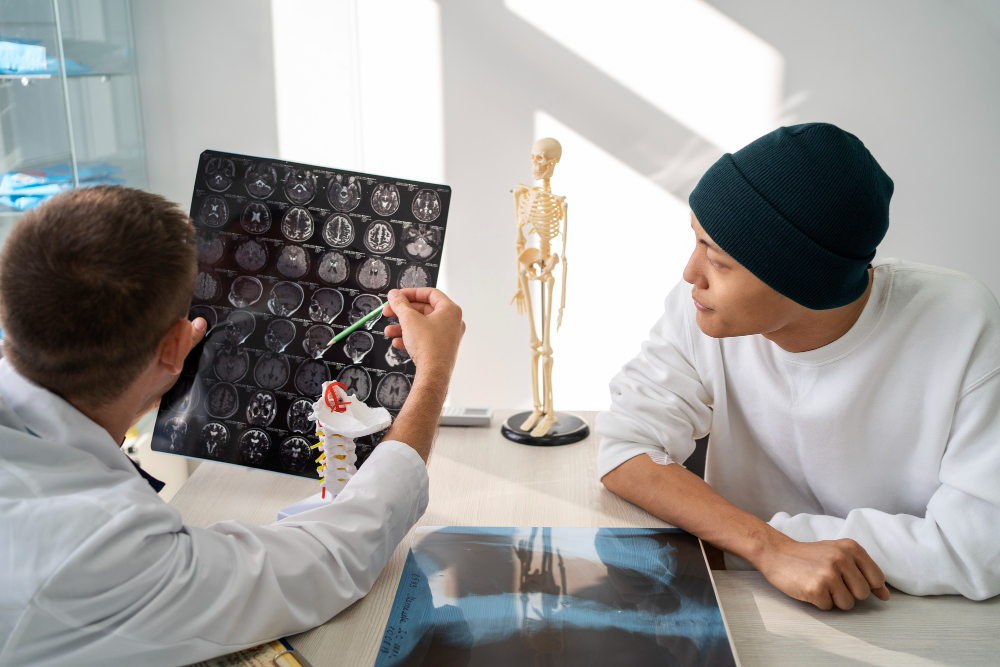Severe traumatic brain injuries (TBIs) resulting from car accidents are among the most devastating outcomes of vehicular collisions. These injuries occur when the brain experiences significant trauma due to the force of impact, leading to potential damage from direct blows, rapid acceleration or deceleration, or penetration by foreign objects. The consequences of such injuries can be life-altering, affecting cognitive functions, physical abilities, and emotional health. Immediate medical intervention and long-term rehabilitation are often required to address the complex and varied symptoms that accompany severe TBIs.
What Is Traumatic Brain Injury?
Traumatic brain injury (TBI) is a form of acquired brain injury that occurs when a sudden trauma causes damage to the brain. This can result from a blow, jolt, or penetrating injury to the head. TBIs can range in severity from mild, such as a brief change in mental status or consciousness (commonly referred to as a concussion), to severe, involving extended periods of unconsciousness or amnesia after the injury. The effects of TBI can include physical, cognitive, emotional, and behavioral impairments, which may be temporary or permanent.
Types Of Traumatic Brain Injuries

Brain injuries can be broadly categorized into open (penetrating) injuries and closed injuries, each with distinct characteristics and implications.
Open (Penetrating) Brain Injuries
Open head injuries occur when the skull is fractured and an object, such as glass, metal, or bone fragments, directly injures the brain. These injuries often appear dramatic because the scalp contains many blood vessels, leading to significant bleeding. All open-head injuries are critical emergencies that require immediate medical attention.
Types of Open (Penetrating) Brain Injuries
Open (penetrating) brain injuries can vary based on the nature of the penetrating object and the resulting damage to the brain tissue.
Here are some types:
1. Gunshot Wounds: Bullets penetrating the skull can cause localized damage to brain tissue along the trajectory of the bullet. The injury severity depends on the bullet’s size, speed, and path through the brain.
2. Stab Wounds: Sharp objects like knives or shards of glass can penetrate the skull, causing focused damage to specific brain areas. These injuries can also introduce debris or foreign materials into the brain tissue.
3. Projectile Injuries: Objects from car accidents or industrial accidents can penetrate the skull and brain, causing extensive damage due to both the impact and potential secondary effects like bleeding and infection.
4. Explosive Injuries: Blast injuries from explosions can cause penetrating brain injuries from shrapnel or debris, leading to complex and often severe damage to multiple areas of the brain.
5. Impalement: Rare but severe, impalement injuries involve objects entering and lodging in the skull and brain, causing significant trauma and requiring immediate surgical intervention to remove the object and repair damage.
Closed Brain Injuries
Closed head injuries are often referred to as “silent killers” due to their insidious nature. Unlike open head injuries, there is no penetration of the skull, and outward signs may be minimal, such as minor cuts or scratches or no visible external injuries at all. Symptoms can manifest immediately or appear gradually over time, spanning hours, days, or even longer. These injuries typically result from blunt force impacts to the head, such as collisions with steering wheels, dashboards, or windows in car accidents.
Types Of Closed Brain Injuries
Closed head injuries encompass a variety of types, each presenting unique characteristics and potential complications:
1. Concussion: A mild form of closed head injury characterized by temporary loss of normal brain function due to impact or shaking. Symptoms may include headache, confusion, nausea, and sensitivity to light and noise.
2. Contusion: This involves bruising of the brain tissue caused by a direct impact on the head. Contusions can lead to localized bleeding and swelling, affecting nearby brain function.
3. Diffuse Axonal Injury (DAI): A more severe closed head injury where rotational forces cause widespread tearing of nerve fibers throughout the brain. DAI can result in coma, persistent vegetative state, or severe cognitive and motor impairments.
4. Coup-Contrecoup Injury: Injuries occur when the force of impact causes the brain to slam into the opposite side of the skull, leading to contusions on both sides of the brain. This typically happens in rapid deceleration injuries, such as car accidents.
5. Hematoma: Blood clots that form within the brain or between the brain and skull (epidural, subdural, or intracerebral hematomas). Hematomas can exert pressure on the brain, leading to potentially life-threatening complications if not promptly treated.
6. Edema: Swelling of the brain tissue due to inflammation and accumulation of fluid. Brain edema can increase pressure inside the skull (intracranial pressure), compromising blood flow and causing further damage to brain cells.
Causes Of Traumatic Brain Injuries
Traumatic brain injuries (TBIs) can result from various incidents and accidents that involve sudden impacts or penetrations to the head. These injuries range from mild concussions to severe brain damage, impacting individuals physically, cognitively, and emotionally.
Motor Vehicle Accidents
- Car crashes, motorcycle accidents, and pedestrian accidents are significant causes of TBIs. The force of impact during collisions can cause the brain to strike against the skull or result in penetrating injuries from shattered glass or other objects.
Falls
- Falls are a leading cause of TBIs, especially among young children and older adults. Falls from heights or slippery surfaces can cause the head to hit the ground or objects, leading to brain trauma.
Sports Injuries
- Contact sports such as football, soccer, and boxing increase the risk of TBIs due to collisions with other players, falls, or impacts from equipment. Even non-contact sports like skiing or biking can result in head injuries during accidents.
Violence
- Assaults, physical altercations, and gunshot wounds can cause penetrating injuries or blunt force trauma to the head, resulting in severe TBIs.
Blast Injuries
- Military personnel and civilians exposed to explosions (such as in combat zones or terrorist attacks) may suffer from TBIs due to the blast wave, which can cause rapid changes in air pressure that affect the brain.
Shaken Baby Syndrome
- Infants and young children can sustain TBIs if violently shaken, causing the brain to impact the skull and leading to severe brain damage or death.
Workplace Accidents
- Industrial accidents falls from heights, or being struck by falling objects in construction or manufacturing settings can result in head injuries and TBIs.
Recreational Accidents
- Activities such as skiing, snowboarding, cycling, or horseback riding can lead to TBIs if accidents occur, causing falls or collisions.
What Are The Long-Term Effects Of Traumatic Brain Injuries?

Traumatic brain injuries (TBIs) can have profound and long-lasting effects on individuals, impacting their physical, cognitive, emotional, and behavioral functions. Depending on the severity and location of the injury, the long-term effects can vary widely:
Physical Effects
TBIs can lead to persistent headaches, dizziness, fatigue, and sensory disturbances such as blurred vision or ringing in the ears. Individuals may also experience motor impairments, including weakness, coordination difficulties, and paralysis in severe cases. These physical challenges can significantly impact daily activities and quality of life.
Cognitive Effects
Cognitive impairments are common following TBIs, affecting memory, attention, reasoning, and problem-solving abilities. Some individuals may struggle with processing speed and multitasking, making it challenging to perform tasks at work or school. Language and communication skills can also be affected, leading to difficulties in expressing thoughts or understanding others.
Emotional and Behavioral Effects
TBIs can alter emotional regulation, leading to mood swings, irritability, anxiety, and depression. Behavioral changes may include impulsivity, disinhibition, social interaction, and relationship difficulties. These changes can strain personal and professional relationships and affect overall emotional well-being.
Neurological and Psychiatric Disorder
In some cases, TBIs can increase the risk of developing neurological disorders such as epilepsy, Parkinson’s disease, or Alzheimer’s disease later in life. Psychiatric disorders such as post-traumatic stress disorder (PTSD) or substance abuse disorders may also arise following a TBI, further complicating recovery and management.
Long-Term Rehabilitation and Support
Managing the long-term effects of TBIs often requires comprehensive rehabilitation programs tailored to address specific impairments. This may include physical therapy to improve motor skills, cognitive rehabilitation to enhance memory and problem-solving abilities, and psychological therapy to address emotional and behavioral challenges. Social support networks and community resources play crucial roles in assisting individuals and their families in adjusting to life after a TBI.
Can Depression Cause Traumatic Brain Injuries?
Depression itself does not directly cause traumatic brain injuries (TBIs) in car accidents. However, depression can indirectly impact the risk of accidents and potentially influence the outcomes of TBIs:
Risk Factors for Accidents: Depression can affect cognitive function, attention, and decision-making abilities, potentially increasing the risk of accidents, including car crashes. Depressed individuals may also engage in behaviors such as substance abuse or reckless driving that further elevate their risk.
Impact on Recovery: If a person with depression experiences a TBI in a car accident, their pre-existing mental health condition can complicate recovery. Depression may delay or interfere with rehabilitation efforts, hinder adherence to medical recommendations, and exacerbate cognitive and emotional symptoms associated with the TBI.
Psychological Impact: Experiencing a TBI can lead to emotional and psychological distress, including depression, due to changes in brain function and the challenges of adapting to new physical and cognitive limitations. This emotional burden can be particularly significant for individuals already managing depression or other mental health conditions.
Reason For Traumatic Brain Injuries In Car Accidents
Drinking and driving significantly increases the risk of car accidents, which can indeed lead to traumatic brain injuries (TBIs). Alcohol impairs cognitive functions, motor skills, and judgment, making it more likely for drivers to engage in risky behaviors such as speeding, running red lights, or failing to yield. These behaviors increase the chances of collisions and severe impacts, which can result in TBIs due to the forces involved in crashes.
TBIs from alcohol-related car accidents can range from mild concussions to severe brain damage, depending on factors such as the speed of the vehicles, the use of safety equipment like seat belts and airbags, and the position and vulnerability of occupants in the cars. The consequences of these injuries can be devastating, impacting not only the individuals involved but also their families and communities.
Efforts to reduce drinking and driving, such as enforcement of strict laws, public awareness campaigns, and education on responsible alcohol consumption, are crucial in preventing TBIs and other injuries resulting from impaired driving. These measures aim to promote safer road behaviors and protect individuals from the life-altering effects of alcohol-related car accidents.
Treatment For Traumatic Brain Injuries
Traumatic brain injuries (TBIs) require prompt and comprehensive treatment to minimize damage, prevent complications, and promote recovery. Treatment approaches can be categorized into surgical and non-surgical methods, depending on the severity and specific nature of the injury.
Surgical Treatment
1. Craniotomy: For severe TBIs with significant bleeding or swelling, a craniotomy may be performed. This involves temporarily removing a portion of the skull to access the brain, remove blood clots (hematomas), repair damaged tissue, or relieve pressure on the brain.
2. Skull Fracture Repair: If the TBI involves a skull fracture that poses a risk of further injury or infection, surgery may be necessary to repair and stabilize the skull.
3. Intracranial Pressure Monitoring: Invasive monitoring of intracranial pressure (ICP) may be performed in critical cases to guide management and prevent secondary brain damage caused by elevated pressure.
Non-Surgical Treatment
1. Monitoring and Observation: For mild to moderate TBIs, medical professionals may opt for close monitoring and observation to manage symptoms and assess the patient’s progress.
2. Medication: Various medications may be prescribed to manage symptoms such as pain, seizures, or agitation. Corticosteroids may be used to reduce brain swelling, and anticonvulsants can help prevent or control seizures.
3. Rehabilitation: Extensive rehabilitation is crucial for maximizing recovery from TBIs.
This may include:
- Physical Therapy: To improve motor function, balance, and coordination.
- Occupational Therapy: To regain skills needed for daily activities and work.
- Speech and Language Therapy: To address communication difficulties and swallowing problems.
- Cognitive Rehabilitation: Exercises and strategies to improve memory, attention, and problem-solving abilities.
4. Psychological Support: Coping with the emotional and psychological effects of a TBI is essential. Counseling and support groups can help patients and their families adjust to life changes, manage stress, and address depression or anxiety.
5. Long-Term Care Planning: For individuals with severe or permanent disabilities, long-term care planning may involve home modifications, assistance with daily activities, and ongoing medical supervision.
How Brain Injury Lawyers Help In Claiming a Settlement?

A brain injury lawyer specializes in assisting individuals who have suffered traumatic brain injuries (TBIs) due to accidents or negligence in navigating the legal process to claim settlements or compensation. Here’s how they can help:
Legal Expertise and Case Evaluation
1. Case Assessment: A brain injury lawyer will assess the details of your case to determine if there is a viable compensation claim. They will review medical records, accident reports, and other relevant documentation to understand the circumstances surrounding the injury.
2. Legal Strategy: Based on their assessment, the lawyer will develop a legal strategy tailored to your specific situation. This strategy may include determining liability, identifying potential defendants (such as negligent drivers or property owners), and outlining the legal basis for your claim.
Negotiation and Settlement
3. Negotiation: Brain injury lawyers have experience negotiating with insurance companies and opposing legal teams to secure a fair settlement. They will advocate on your behalf to ensure that you receive adequate compensation for medical expenses, lost wages, pain and suffering, and other damages related to the injury.
4. Court Representation: If a fair settlement cannot be reached through negotiation, the lawyer will prepare your case for litigation and represent you in court. They will present evidence, cross-examine witnesses, and argue your case before a judge or jury to seek a favorable verdict.
Advocacy and Support
5. Access to Resources: Brain injury lawyers often have access to medical experts, vocational specialists, and other professionals who can provide expert testimony to support your case. They can also assist in documenting the long-term impact of the injury on your life and future needs for medical care and rehabilitation.
6. Guidance Throughout the Process: Dealing with a brain injury can be overwhelming, and a lawyer provides guidance and support throughout the legal process. They can answer your questions, explain your rights, and ensure that your interests are protected every step of the way.
FAQs
What are severe traumatic brain injuries (TBIs) in the context of car accidents?
Severe TBIs from car accidents result from significant trauma to the brain, typically due to the force of impact or penetration of foreign objects into the skull. These injuries can lead to long-term cognitive, physical, and emotional impairments.
What are common symptoms of severe TBIs after a car accident?
Symptoms may include loss of consciousness, persistent headaches, confusion, memory problems, nausea, sensitivity to light and noise, and changes in mood or behavior.
What are the treatment options for severe TBIs from car accidents?
Treatment may include emergency care to stabilize the patient, surgical interventions to repair skull fractures or remove hematomas, medication to manage symptoms, and long-term rehabilitation involving physical, occupational, and speech therapies.
What are the long-term effects of severe TBIs from car accidents?
Long-term effects can include cognitive deficits, motor impairments, emotional disturbances such as depression or anxiety, and increased risk of neurological conditions.
Seeking For Help Related To Traumatic Brain Injuries or Head Injuries
If you or a loved one has suffered a severe traumatic brain injury (TBI) in a car accident, our experienced brain injury lawyers are here to help. We understand the complexities of TBIs and the impact they have on individuals and families. With our expertise in personal injury law, we advocate fiercely for your rights to ensure you receive the compensation you deserve for medical expenses, lost wages, and pain and suffering. Contact us today for a consultation to discuss your case.
Interesting Read: